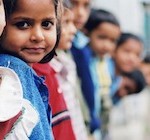Jhabua, Madhya Pradesh: The story of a three-year-old girl saved from malnutrition has become a case study of what is wrong and right with India’s child health problems. Ramavati, whose name has been changed to protect her identity, was discovered during a pre-screening session of the children carried out by staff of Real Medicine Foundation’s (RMF) ‘malnutrition program’ in Madhya Pradesh.
Ramavati was in the care of her grandparents when her condition was diagnosed. They were given assurances that their farm and livestock would be protected if they agreed to stay in the hospital with the three-year-old girl while her treatment was carried out without a charge.
In bringing the toddler back to health, the staff of RMF discovered 47 other cases of malnourished children who were also saved with the organization’s treatment program. It became clear these cases were like specks of dust in a dust storm.
Madhya Pradesh has been plagued with some of the highest number of malnutrition and undernourishment cases in children for a long time. The most cited causes for malnutrition are income disparity, lack of public hygiene, sanitation and health education. But I wanted to delve deeper into the situation to get further details.
I began to notice that while on one hand health education, sanitation, hygiene and environment are factors that account for malnutrition and undernourishment of children, it is also true that lifestyle choices, cultural beliefs and regional practices play a big role in exacerbating the problem.
The example of Ramavati seems to be a case study because malnutrition of children is a condition across India. Despite rapid industrialization, agricultural production and the much-discussed-about economic growth, India is home to one-third of the world’s malnourished children. According to recent surveys, 40% of India’s children are underweight and in Madhya Pradesh alone, 60% of children below three years of age are underweight.
On a national scale, this condition leads to stunted physical growth, lower educational achievement, lower socio-economic statuses, reduced capabilities to do physical work and reduced productivity.
One approach to the problem is to concentrate on using local help. The Angan Wadi Centres (AWC) established by the Atal Bal Arogya Evam Poshan Mission, an initiative of the Madhya Pradesh Government, hires Angan Wadi Workers to improve health education to pregnant women, provide nutritional food to expecting mothers as well as young children and to provide pre-school education to children between three to six years of age.
These workers are also responsible for accessing and screening children, who are severely and moderately malnourished in the district and provide linkages to treatments and services for the same.
In recent years, the role of the workers has been expanded: they now distribute nutritious take-home food for six days, to children between six months and six years of age; they provide freshly-cooked breakfast and lunch; they also monitor and track the weight of all the children registered at the centre. As a part of widening the outreach, the Angan Wadi Workers also conduct pre-school education as well as home visits.
In the end, it may be only through local efforts like these, by enforcing individual responsibility, which will play the biggest part in combating the plague of malnourished children across our nation.
Niki A. Shah is a researcher at the Center for the Study for Genocide, Conflict Resolution and Human Rights at Rutgers University in Newark, New Jersey, USA. His research is focused on governance and development within the context of South Asia.
This blog was exclusively written for Gateway House: Indian Council on Global Relations. You can read more exclusive content here.
For interview requests with the author, or for permission to republish, please contact outreach@gatewayhouse.in.
© Copyright 2012 Gateway House: Indian Council on Global Relations. All rights reserved. Any unauthorized copying or reproduction is strictly prohibited


